The Filipino Sari-Sari Store
Small store, big impact.
You know you’re in the Philippines when every neighborhood, no matter how big or small, has one: a tiny shop tucked into the corner of someone’s house, with hanging sachets of coffee, shampoo, and snacks dancing in the wind.
The sari-sari store – literally meaning “variety” in Tagalog – is our local version of the corner store. It’s the beating heart of every barangay, that uniquely Filipino mix of business, community, and chaos that somehow keeps everything running.
The last time I walked into one was before I left for Calgary in 2013. Back then, the sari-sari store was my personal Amazon and Shopee rolled into one.
Need eggs? They’ve got it.
Out of milk? No problem.
Craving canned luncheon meat because your fridge is emptier than your soul after finals week?
They’ve got that too. It’s your one-stop shop when you only need to stop for one or two things, and not a whole grocery haul.
And if you grew up in the Philippines, you probably have a sari-sari story too. I still remember being about eight or nine, sent on “important” errands by my parents to buy a pack of cigarettes. In hindsight, I can’t tell if that says more about our old outdated policies or our extreme trust issues — the kind where we trust too much that kids won’t smoke what they’re buying.
I don’t know if you can still do that today. I hope not. But that was part of the charm: everyone knew everyone, and trust was the default setting.
(Does this mean I’m gonna set my son off to buy a pack of cigarettes for cultural training? Perhaps not. I don’t even smoke. But my intrusive thoughts are telling me to do it just for kicks… Don’t worry I won’t.)
A Little Bit of History
The sari-sari store isn’t new. Historians trace its origins to early Chinese traders who settled in the Philippines during the Sung Dynasty as far back as the 12th century.
They sold daily essentials in small quantities to local villagers, a habit that blended perfectly with Filipino culture. By the American colonial period, sari-sari stores were already everywhere, serving as micro-economies for families trying to make a living from their front yards.
The concept fits the Filipino way of life perfectly. We’re a nation of tingi-tingi, or “buying in small portions.” Why buy a whole bottle of shampoo when you can get one sachet for today? Why purchase a week’s worth of coffee when you can grab one packet at a time?
Perhaps it’s thriftiness. But I think it’s also for adaptability. It’s making things work, even when life doesn’t give you a full pack.
The Corner Store of Community Life
What makes the sari-sari store special isn’t the inventory. It’s the people orbiting around it.
Neighbors stop by not just to shop but to chat. Kids hang out after school, pooling coins for candy or soda (or as we like to call them, “soft drinks”). Someone’s always leaning on the counter, fan in hand, catching up on the latest neighborhood gossip. The sari-sari store is where “chika” — friendly gossip — lives and breathes.
And dare I say, where Marites was officially born.

And before anyone writes gossip off as negative, let’s give it credit where it’s due. Gossip, in Filipino communities, is often an informal safety net. It’s how we protect each other. How else would you know which streetlights are busted, which alley to avoid after dark, or which dog in the neighborhood bites?
Local store owners, known for their eagle eyes, are often the first to notice when something’s off. They know everyone’s face, everyone’s habits, everyone’s usual purchases. They’re the quiet watchtowers of the community.
That kind of grassroots awareness is powerful. It’s not “nosiness.” It’s mutual vigilance disguised as casual conversation. And in a country where official systems can sometimes fall short, the sari-sari store keeps people informed in ways the internet never could.
A Place for Growing Up
My relationship with the sari-sari store grew with me. As a child, it was a candy heaven and an errand outpost. As a teenager, it became my emotional hotline. I still remember rushing there after school, fumbling through coins to top up my mobile prepaid load so I could text my high school boyfriend.
Each text cost one peso. Each top-up was a lifeline. Now that I look back, I thank the universe for every day that little store was closed when I “needed” it. It probably saved me from wasting my allowance on boys who didn’t deserve my load balance.
But there’s something timeless about that routine. The rhythm of buying, chatting, waving goodbye. The mix of laughter and mild gossip floating in the humid air. In those moments, the sari-sari store wasn’t just a store. It was where life unfolded in tiny, everyday doses.
Small Business, Big Resilience
Behind the counter, usually, is a woman — often a mother or grandmother — who runs the store as both a business and a lifeline. Many families rely on sari-sari income to cover bills, school expenses, and groceries. It’s entrepreneurship at its simplest and purest form: buying wholesale, selling retail, making small profits that add up to survival.
During the pandemic, when mobility was restricted, sari-sari stores became even more vital. They were local supply chains, delivering essentials when supermarkets were closed or too far to reach.
Many owners started using mobile wallets like GCash and PayMaya to accept cashless payments. Some began offering delivery through riders on bikes or tricycles. That adaptability is what keeps the sari-sari store alive in the modern world.
Today, you might find one with a QR code taped to the counter. They still sell snacks, soft drinks, and soap, but they also sell mobile data, prepaid electricity, and online payment credits. Some even take orders through Facebook Messenger. The shelves may still be made of plywood, but behind them is a quiet revolution of digital inclusion.
The Sari-Sari Store as a Mirror of Filipino Life
If you look closely, the sari-sari store reflects everything about Filipino culture — our resilience, creativity, humor, and social spirit. It’s not fancy. And it doesn’t try to be. It’s practical and personal. It’s built on trust and relationships more than anything else.
The owner usually knows who’s a regular and who’s new in the area. They know who still owes them 20 pesos for that soda last week. They know which kid just transferred schools and which mother’s about to give birth. They might even know before the barangay captain does. And that’s the beauty of it: this entire information network runs on conversation and connection.
A Filipino Icon That Keeps Evolving
The sari-sari store has outlasted empires, recessions, and even the rise of online shopping. It survived Spanish rule, American capitalism, and now the digital age. You can digitize payments, modernize logistics, and deliver groceries in 15 minutes, but you can’t replicate the warmth of hearing, “Oh, you’re back in town! How’s Canada?” from someone behind a window stacked with potato chips.
That’s why the sari-sari store remains such an enduring part of Filipino identity. It’s not just commerce. It’s connection.
It’s the smell of cold soda bottles, the sound of coins clinking in a metal tray, the laughter of neighbors trading news about each other’s lives. It’s the soul of the street that no app can and will ever replace.
So, here’s to the sari-sari store. The tiny business that holds an entire community together. The little window where you buy instant coffee, trade gossip, pay your phone bill, and get life advice all in one stop. It’s more than a shop. It’s a story. And it’s still being written, one sachet at a time.



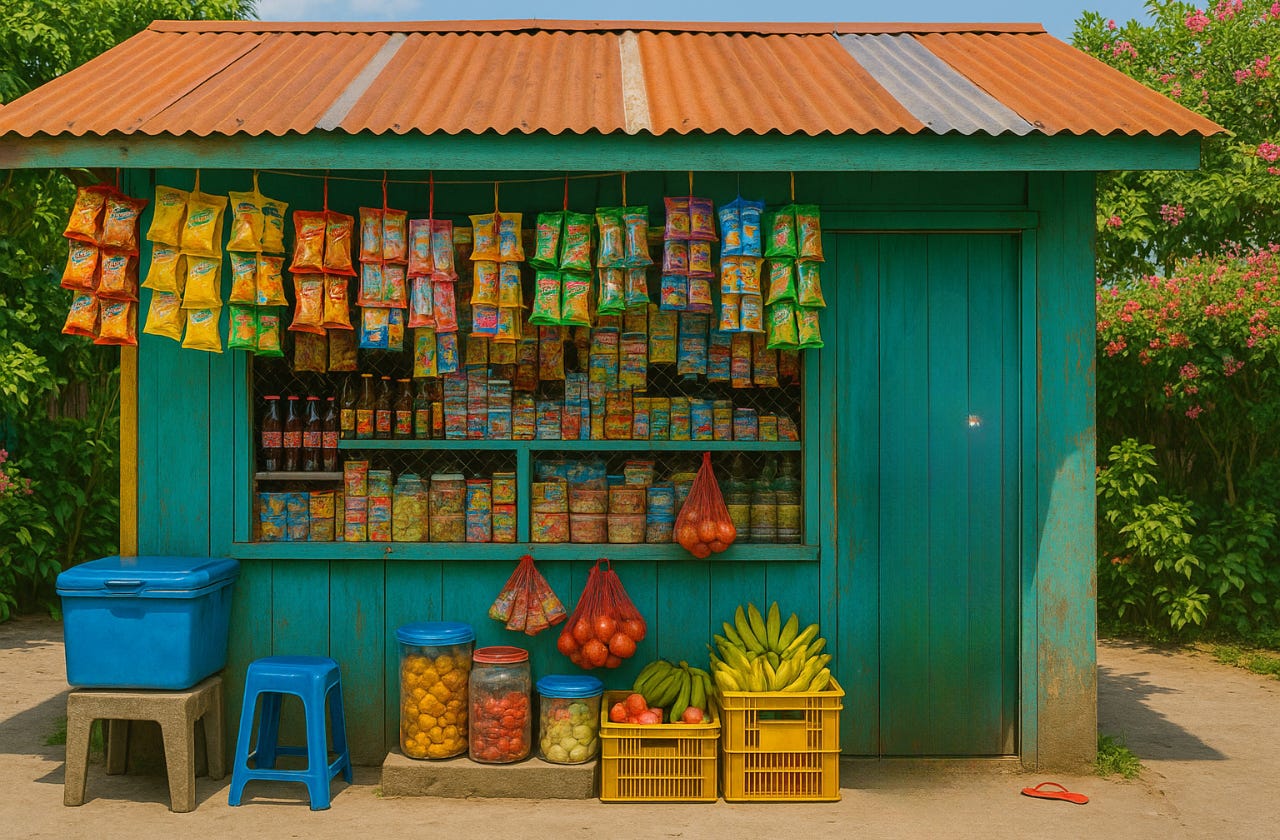
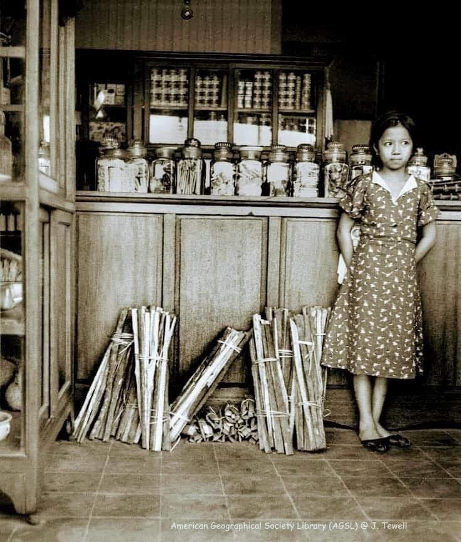
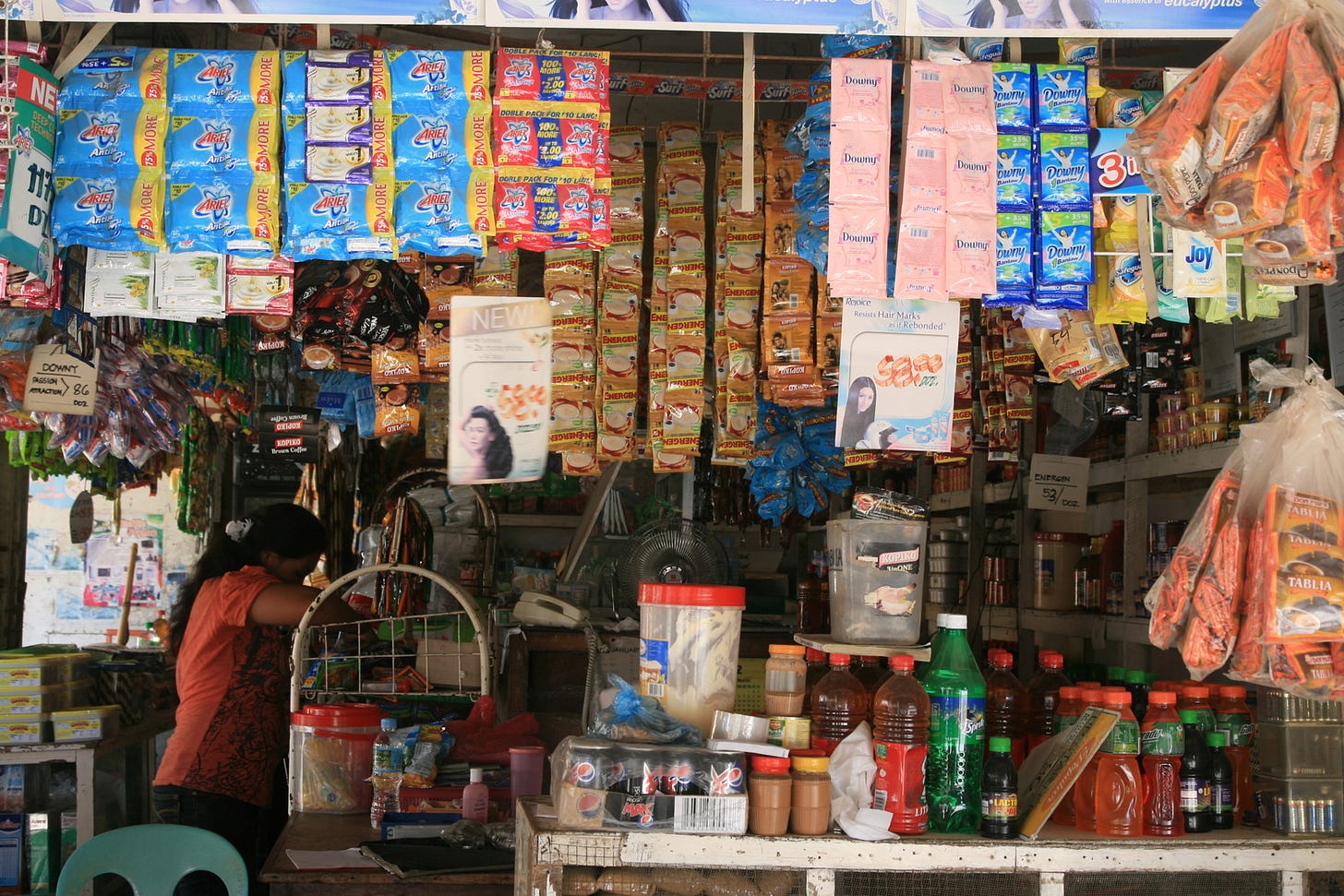
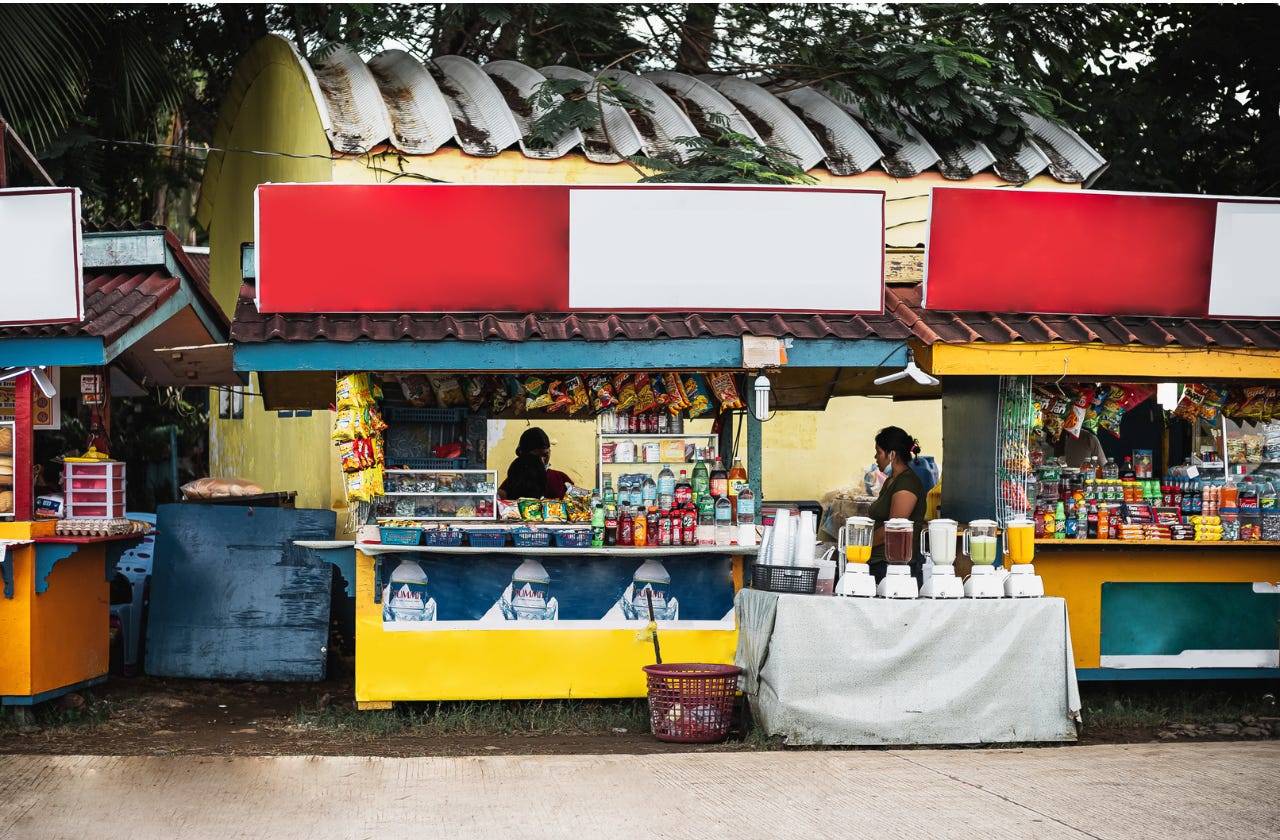
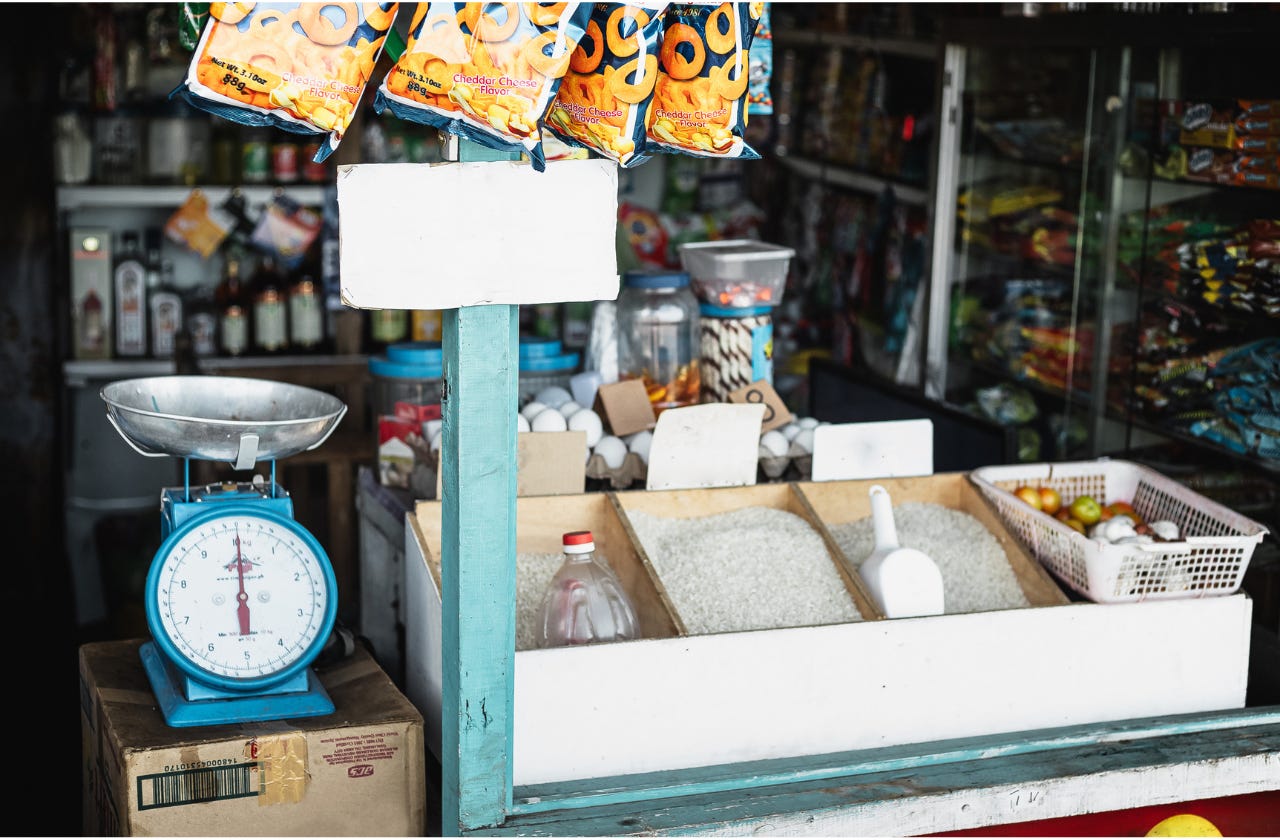
Beautifully told. The sari-sari store isn’t just commerce — it’s culture in motion.
This smells like my childhood! Going to the Sari Sari to get "the good coke in the glass bottle". Candies. Ice candy. I miss my trips to the Philippines, the US could never lol.